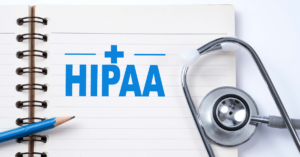In the healthcare industry, marketers must balance the goal of attracting and retaining patients with strict privacy and security regulations. The Health Insurance Portability and Accountability Act (HIPAA) plays a critical role in this context, ensuring that healthcare providers prioritize patient data privacy and security.
HIPAA isn’t merely a marketing best practice; it’s a legal obligation. Non-compliance can lead to substantial fines, legal repercussions, and lasting damage to a healthcare provider’s reputation.
In this post, we’ll explore why HIPAA compliance is critical and how it not only safeguards patient privacy but also enhances the effectiveness of healthcare organizations’ marketing efforts. We’ll also provide you with a simple checklist to help you ensure all of your marketing activities are fully
Importance of HIPAA Compliance in Healthcare Marketing
By integrating HIPAA compliance into their marketing strategies, healthcare organizations can confidently promote their services while protecting patient rights and maintaining the trust and confidence of their audience.
Here are seven reasons why HIPAA compliance is so important:
- Protects Patient Privacy: HIPAA sets strict rules to protect Protected Health Information (PHI). From email campaigns to social media ads, any marketing activity that involves PHI must follow these guidelines to avoid data misuse.
- Builds Trust with Patients: Patients want to know their healthcare providers will protect their sensitive information. By complying with HIPAA, you show your commitment to their privacy and rights, which builds trust and loyalty.
- Avoids Legal and Financial Penalties: Failing to comply with HIPAA can result in hefty fines, legal action, and irreversible damage to your brand. Stay compliant to avoid these costly consequences.
- Supports Ethical Marketing Practices: Ethical marketing is the cornerstone of a successful healthcare strategy. HIPAA compliance ensures that your marketing respects patient privacy, aligning with ethical standards and patient expectations.
- Enhances Brand Reputation: In a highly competitive healthcare landscape, your reputation is everything. Providers that prioritize HIPAA compliance are seen as trustworthy, professional, and responsible—qualities that attract patients.
- Secures Digital Marketing Tools: Today’s marketing relies on digital tools like email, social media, and ads. HIPAA compliance ensures that these tools are secure, with encrypted data transmission and strict access controls, preventing breaches.
- Mitigates Data Breach Risks: Data breaches can be catastrophic for healthcare organizations. HIPAA-compliant practices implement safeguards that minimize breach risks, such as secure data storage, access limits, and regular audits.
Key Checklist Items
So now you know why HIPAA compliance is so important, here’s a check checklist to ensure your marketing activities remain on the right side of the legislation:
Understand Protected Health Information (PHI)
Protected Health Information (PHI) refers to any information that can identify an individual and relates to their health, medical history, treatments, or payment for healthcare services. It includes details such as names, addresses, phone numbers, Social Security numbers, medical record numbers, insurance details, and even biometric identifiers like fingerprints or facial recognition data. For example, a patient’s medical history, billing statement, or lab test results that include their name or other identifying details qualify as PHI. Under HIPAA, organizations handling PHI must protect it from unauthorized access or misuse, ensuring the confidentiality and security of this sensitive information in all communications and records.
Data Security Measures
Data security measures are a cornerstone of HIPAA compliance, ensuring that Protected Health Information (PHI) remains confidential and secure. Organizations must implement safeguards such as encryption to protect data during transmission and storage, limiting the risk of breaches. Access controls are also critical, ensuring that only authorized personnel can view or handle PHI. Other key measures include regular risk assessments to identify vulnerabilities, using secure systems for electronic communications, and maintaining activity logs to monitor access and detect unauthorized attempts. Training employees on security protocols further reduces risks.
Third-Party Vendor Compliance
Third-party vendor compliance is a critical aspect of HIPAA regulations, as many healthcare organizations rely on external partners to handle Protected Health Information (PHI) for services like billing, data storage, marketing, and IT support. HIPAA requires healthcare entities to establish a Business Associate Agreement (BAA) with these vendors, ensuring they comply with the same privacy and security standards. The BAA outlines the vendor’s responsibilities for safeguarding PHI, reporting breaches, and implementing appropriate security measures. Organizations must also vet vendors thoroughly to confirm their compliance practices, conduct regular audits, and monitor their activities. By ensuring third-party compliance, healthcare providers protect patient data, avoid potential breaches, and maintain their own regulatory standing.
Staff Training and Awareness
Staff training and awareness are essential to HIPAA compliance, as employees play a critical role in protecting Protected Health Information (PHI). Comprehensive training ensures that staff understand HIPAA regulations, including privacy and security rules, and how to apply them in their daily tasks. Training topics should cover proper handling of PHI, recognizing potential security risks, using secure communication channels, and responding to suspected breaches. Regular refresher courses help maintain compliance and keep staff updated on any changes to regulations. Additionally, fostering a culture of awareness encourages employees to prioritize patient data security, report incidents promptly, and minimize human errors that could lead to HIPAA violations. Effective training reduces risks, safeguards patient trust, and strengthens organizational compliance.
Privacy Policies and Procedures
Privacy policies and procedures are fundamental to achieving HIPAA compliance, as they establish clear guidelines for handling Protected Health Information (PHI). These policies outline how PHI is collected, used, stored, shared, and disposed of, ensuring that every step aligns with HIPAA’s privacy and security rules. Procedures should address key areas such as obtaining patient consent, limiting PHI access to authorized personnel, and securely transmitting or storing data. Organizations must also include processes for responding to breaches, patient requests for access to their information, and complaints about privacy violations. Regular reviews and updates to these policies ensure they remain effective and compliant with evolving regulations. Clear, well-communicated privacy policies demonstrate an organization’s commitment to protecting patient rights and maintaining trust.
Marketing Consent
Under HIPAA, healthcare organizations must obtain explicit, written authorization from patients before using their Protected Health Information (PHI) for marketing activities. This consent must clearly outline how the information will be used, the type of marketing involved, and the patient’s right to revoke authorization at any time. Exceptions exist for communications about treatment, care coordination, or services offered directly by the healthcare provider as long as no financial remuneration is involved. By securing proper marketing consent, organizations can engage patients ethically, comply with legal requirements, and maintain trust while promoting their services.
Breach Notification Procedures
HIPAA mandates that if a breach involving unsecured PHI happens, the affected individuals must be notified within 60 days of discovering the breach. The notification must include a description of the breach, the types of information affected, steps the organization is taking to mitigate harm, and how individuals can protect themselves from potential risks. In cases of large-scale breaches, the organization must notify the Department of Health and Human Services (HHS) and, in some cases, the media. Additionally, healthcare providers are required to implement corrective actions and improve security measures to prevent future breaches. These procedures help organizations maintain transparency, accountability, and trust with patients while adhering to HIPAA’s stringent regulations.
Marketing Professional Best Practices
By establishing clear guidelines for handling Protected Health Information (PHI), HIPAA encourages healthcare organizations to prioritize secure, responsible use of patient data in their marketing campaigns. For instance, HIPAA compliance prevents the misuse of sensitive information for targeted advertising without patient consent, ensuring that all marketing materials are aligned with patient rights. It also promotes transparency, requiring organizations to obtain explicit consent before using patient data for marketing purposes. By following HIPAA’s rules, healthcare providers can create ethical, data-protected marketing strategies that foster patient trust, enhance brand reputation, and avoid legal risks while remaining competitive in the marketplace.
The Takeaway
HIPAA compliance is essential for healthcare marketers to ensure the privacy and security of patient data while promoting services effectively. By adhering to key guidelines, such as obtaining explicit marketing consent, safeguarding Protected Health Information (PHI), and securing third-party vendor compliance, healthcare organizations can build trust with patients, avoid legal penalties, and enhance their brand reputation. Additionally, implementing strong data security measures, staff training, and breach notification procedures fosters transparency and accountability. With HIPAA in place, healthcare providers can create ethical, patient-focused marketing strategies that protect privacy and strengthen relationships with their audience.
Learn More
To learn more about how the emfluence Marketing Platform can help you become a more confident, HIPAA-compliant marketer, schedule a call with one of our healthcare marketing experts today at expert@emfluence.com.


